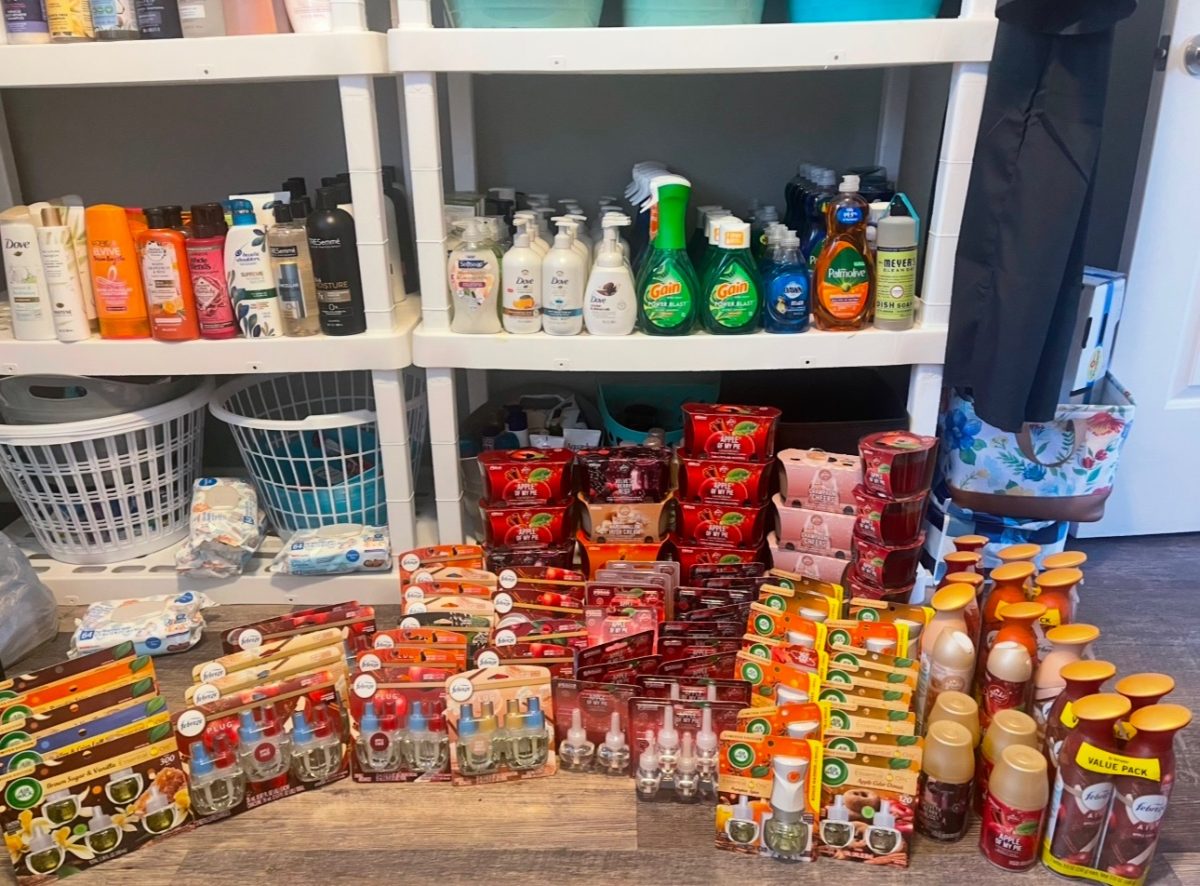One corner of Avery Feathers’ office holds a typical array of work supplies. At her desk, she has a swivel chair perched in front of her computer, pens strewn around. It’s a small, cozy room, but the other three corners hold stacked PVC shelves that resemble a mini-drug store. Each shelf, five layers high, held rows of various brands of laundry detergent, giant blocks of toilet paper and lines of Dove body wash bottles. One shelf is dedicated just to at least 10 types of soap, while tote bins of feminine products are stacked on top of one another.
Feathers’ office is full, but she’s not a hoarder. As a 24-year-old first grade teacher, Feathers has developed her couponing skills to resell items below retail price as a way to supplement her income.
She sits on her living room sofa with a warm, polite smile and a sophisticated blouse of different shades of gray. On her coffee table, a stack of elementary math assignments lay ungraded as she twists her wedding ring. Feathers has worked as a teacher since the summer of 2023, but her couponing journey stretches further back into 2020. At that time, she was attending Ferris State University in Michigan while living with her now husband.
“I like to pick up hobbies that I don’t usually keep, and I think this was just kind of like another hobby to keep me busy and also save me money being a broke college student,” Feathers said.
At first, she just started couponing for herself, getting deals for household products like toothpaste and paper toweling. While she lived in Michigan, she worked at Rite Aid, a drugstore chain similar to CVS or Walgreens, where she had the advantage of knowing deals before they were released. Feathers began watching creators on YouTube who made content exclusively about how to find the best weekly deals at different chains. Each week, she’d watch hours of drugstore hauls, discount announcements and coupon offers while combing through various coupon apps to try and curate the most cost-efficient way to shop. These deal-hunting influencers are the people that inspired Feathers to begin selling the items she bought but wouldn’t use. She developed a sort of addiction to saving.
“I would say it’s like a high, like you feel just this immense feeling of happiness when a deal goes good,” Feathers said. “It’s just a weird feeling leaving the story with bags full of things that you paid nothing for … it’s just a really good feeling.”
A couple years into her couponing journey in Feathers’ former Green Bay home, she had lined the walls of her basement with products from her weekly shopping spree. She remembers having about eight shelving units completely filled with products.
“Once I started getting a big enough stock where I’m like ‘I’m never going to use this,’ I’m like, ‘I want to start selling this,’” Feathers said.
At first, Feathers mainly sold her stock to her family in Upper Michigan when she visited. She’d take requests of what her family needed and sell it to them for a heavily discounted price before eventually expanding her business to others in the area.
“I would easily make $700, $800 in a weekend just bringing my stuff up there,” Feathers said. “So, yeah, it was nice having that extra income and just knowing I’m helping people.”
Amy Neuens, Feathers’ aunt and a regular customer, said she saves about $1000 per year buying household essentials from Feathers’ stockpile. Almost all of Neuens’ soaps, air fresheners, deodorants and similar items are purchased exclusively through Feathers, who delivers them right to her aunt’s door.
“I pretty much do all of my household products through Avery,” Neuens said.
This system has fared well for Neuens, who doesn’t even have to leave her house to shop for these items or think about what kind of a product to get. Feathers curates a box of goods, which she brings to Neuens several times throughout the year.
“I tell her to just load it up and bring me a $100 worth of stuff or more, and she knows pretty much what I use,” Neuens said.
Neuens estimates that each box, which she pays $100 for, retails for roughly $300.
On top of selling to her family and friends, Feathers has posted her products on Facebook Marketplace, where other couponers sell bundles of household goods ranging anywhere from $10-$100 depending on the size. She’s even gained a loyal customer who makes a three-hour drive to Feathers’ home in Menasha, Wisconsin, just to shop around in Feathers’ office.
However, Feathers said a large chunk of her couponing income has come from garage sales, where she displays her stock outside for sale. She had tested this selling strategy out for the first time this summer.
“I just, like, hoarded everything and then set it all for sale,” Feathers said. “[I] made a couple thousand [dollars] during the summer just from that.”
In 2024, Feathers made an initial investment of about $100 into her stock, which is continuously recycled via cashback and rewards points. So far, Feathers estimates that she made between $5,000 – $6,000 from her couponing sales this year, although this number is lower than past years due to her entering her career.
“I’m a full-time teacher now, so it’s gotten a lot harder to find time to coupon,” Feathers said.
Creating a deal takes time.
By 5 a.m. Sunday morning, just hours after major couponing chains like CVS and Walgreens have released their discounts, influencers are already posting their drugstore savings hauls. Before even getting out of bed, Feathers watches these online hauls as she plans which stores she will go to, what she will buy and how many. Feathers uses a combination of digital coupons along with print coupons, which some couponers will buy from one another as print becomes less popular.
Then, Feathers analyzes her notes app, where she logs product prices and quantities, to help her build the best possible deal. If she’s not getting at least 80% of retail price knocked off of her purchase, she’s not interested. Finally, Feathers weighs in extra discounts from third-party cash-back apps. She spends several hours each week just planning her shopping trip before she sets foot out the door.
By midday Sunday, Feathers has just a narrow window of time before she misses out on the week’s best deals.
“The new deals start on Sundays,” she said. “So, people will go Sundays because all the stock will be in still. If you go like Wednesday, Thursday, Friday, the stock lowers because the deal’s been happening for so many days already.”
Nikki Will, a Walgreens employee of nine years, said dealing with Sunday’s influx of couponers on top of regular store duties and customers can be difficult, but they are generally agreeable.
“I do understand why [couponers] do this, and in all honesty, if a couponer is nice and doesn’t get angry if there is a flaw in their system or ours, I have a much better experience. I’m sure they do too,” Will said.
Couponers spend a lot of time building their deals. Will said couponers often spend so much time strategizing their savings that they claim to know more about Walgreen’s check-out system than employees.
“Sometimes I do want to ask [couponers] to clock in,” she said. “I could use the help.”
As a couponer, Feathers said she tries her best to be polite while she’s sleuthing for sales. She’s gotten to know cashiers at her local CVS, her favorite place to coupon, to help make her purchase run as smoothly as possible. In line, she’s hyper-aware of people behind her and will loop around the register if she needs to make multiple transactions to maximize her savings.
“I’m sure I’ve gotten a few eyerolls here and there, but I just kind of don’t look at them because I’m scared sometimes that they’re going to be mean to me, and then I’ll probably start crying,” Feathers said.
With so much demand, Walgreens had to try their best to keep up. Walgreens has implemented coupon policy changes and has seen a decrease in the amount of couponers.
“We used to have way more couponers [who] would take a lot of time, and our systems and registers would go down,” Will said. “That was frustrating, but hasn’t happened in a while.”
New Walgreens policies, like not allowing register rewards for curbside pickup and fewer cash rewards, can deter couponers from creating and cashing in on deals. Feathers said that she’s seen a decline in savings opportunities since she began.
“It’s gotten harder to coupon just because deals aren’t as good as they used to be,” she said. “And then also, not having as many paper coupons, you can’t get as good of deals.”
While discounts may not be as impressive as they once were, Feathers said there is still a lot of opportunity to save, even at a more casual level. She abides by her mantra “any savings is good savings.” With the advent of digital couponing, Feathers said it’s easy to get deals right from her cell phone for day-to-day needs.
“Even if it’s small things here or there, like getting free toothpaste or shampoo or body wash, it honestly adds up,” she said.
Although she’s started her full-time career and deals have decreased, Feathers said she doesn’t see herself quitting couponing any time soon.
“I could never see myself not couponing,” she said. “… I can’t imagine ever paying for toothpaste.”









